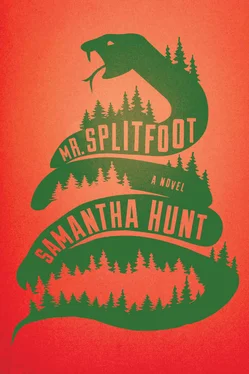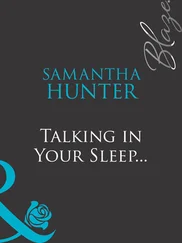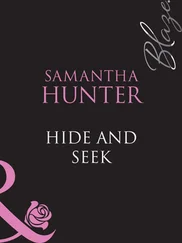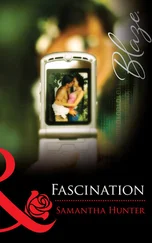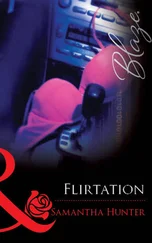“She couldn’t talk anymore?”
“It happens.” Mr. Bell shrugs. “The second-to-last night of the tour, they were in LA, maybe the new girlfriend was in the audience, maybe there was a knife or a gun. Who knows. People say Linda sang more beautifully that night than ever before. Something beyond human abilities.”
“Fury.”
“Maybe. Grief. Shock. They’ve never released the tapes. Then she lost her voice.”
“She ever get it back?”
“Yeah. But it took a long time. I’d imagine a person could get used to not talking. It would be hard to start again.”
“If you grew up here, how’d you know about that?”
“My dear.” Mr. Bell leans back; his T-shirt lifts, exposing a flash of stomach. “I’ve not lived among the Etherists since I was fourteen,” he says, as if he’s just a normal boy who grew to a man in America, someone who likes rock and roll.
Ruth makes a funny smile.
“What is it?”
“Nat and I used to think we invented you.”
“Hmm.”
“Like you were a dream we had. We made you up because we could never imagine where you came from.”
“I’ll try to take that as a compliment.” He screws his eyes in mock puzzlement. “I might be strange, but I assure you”—his voice lowers—“I’m real.” And to demonstrate his realness, Mr. Bell lifts Ruth’s hand to his forehead like she’s a cool towel on a fevered brow. He drags it across his cheek until Ruth is cupping his chin, his breath.
Ruth drops her hand back to her leg, breathing heavily, burned.
“The Thompsons spent some time in a religious sect themselves.”
Ruth listens to Linda sing. “She did?” Linda Thompson’s voice is power and submission, spirit without religion.
“Sure. Religions need women. Who else would do all the work?”
Ruth nods.
On the album cover, Richard sits on the floor in a yellow room. His legs are open, his arms are too. Bravado and confidence. Linda’s trapped in a framed photograph on the wall above him. Just her head, no body. Richard doesn’t look at Linda. Linda doesn’t look at him.
“I often wonder who I’d be if my mother raised me. Maybe I’d be better.”
“Maybe you’d be dead,” he says.
“Yeah.”
“And maybe you wouldn’t be the wholly perfect Ruth you already are.”
There’s a closet in the living room. Ruth ducks into it, flushed. She digs through the board games and books there to calm the idea that Mr. Bell will, any minute now, devour her in a way that’s not yet been confirmed in her life. In the closet she finds a Walkman and an old tape recorder that looks like a mini robot with a plug-in microphone and five lever buttons at one end. Beside it, a carton with three blank tapes. Ruth calms herself by pushing the buttons. She brings the device to him. “I want to record some of these songs.”
“On that?” Mr. Bell lifts his top lip, like there’s a bad odor. When Mr. Bell tries to act older than he is — as if he’s full of knowledge and experience — it ends up making him seem even younger to Ruth.
“Yeah. So I can take it with me.”
“That”—he points to the tape recorder—“is a Dictaphone. This,” Mr. Bell says, flanking the stereo, his hands like a spokesmodel’s, tilted to display, “is a hi-fi system. You know what that means?”
“No.”
“High fidelity. Intense truthfulness. Painful purity. You cannot use an old Dictaphone to capture faithfulness.”
Ruth thinks about this for a moment. I’ll just record it when he’s asleep. Hell with fidelity. She’s not leaving the mountain without Linda Thompson. Ruth returns to the stacks. She thumbs past Mario Lanza and Kenny Loggins. “What’s this?” She pulls out several copies of the same record. Each one wrapped in plain brown kraft paper like a porn mag. She removes one from its sleeve and is surprised to find that the vinyl is not black but a beautiful glowing yellow gold.
He clambers toward her on his knees. “The golden records. Man. I haven’t seen these in a long time.”
“What’s on them?”
“Remember Voyager ?”
“No.”
“NASA sent up two satellites in ’77, and on board both they packed golden records in case the satellite should ever encounter someone who might want to listen.”
Ruth’s eyes flash. “Aliens?”
“Yup.”
“What’s on the records?”
“Pictures of life on Earth. DNA sequences, babies, bugs. Music.”
“A real catalog. How did they choose what got to go?”
“How do you make a record of everything in a finite space? Hard job.”
“Yes. But what are these?”
“Mardellion thought the Voyager mission was perfection. Sagan and Ann Druyan produced the records, and for Mardellion it was faultless. See, Golden Records, Golden Tablets. The records made a link between Joseph Smith and Carl Sagan; religion and science. It was natural. So once someone had been with Mardellion long enough, he would ‘reveal’ his involvement with the Voyager missions. This was carefully guarded information, a secret, something a follower had to earn by proving their total faith. You’d have to have total faith to believe that bull. NASA hires a pharmacy clerk to represent Earth among the aliens? Not that Mardellion thought it was untrue. I think he really believed he was cosmically responsible for the Golden Records. It wouldn’t be so hard. Belief just takes steady convincing. Mardellion had a studio in Massapequa press duplicates of the original songs sent to space. In reality, he had nothing to do with Voyager . Still, that doesn’t mean the records aren’t cool.”
Mr. Bell removes the record from its sleeve. The center label says, The Sounds of the Earth, To the Maker of Music — all worlds, all times. He slips it onto the stereo and lies back on the thin and dusty rug. The record begins to pop.
An old man with a funny accent speaks.
“Is that Sagan?”
“Nah. Kurt Waldheim, Secretary-General of the UN and, sadly, a Nazi.”
“They sent a Nazi into outer space?”
“They didn’t know he was a Nazi in ’77. Unfortunate though interesting choice, since it could almost convince you that some cosmic truth of our existence slips in no matter how much Sagan and Druyan tried to control it. Waldheim’s dead now. Lots of the people on this record are dead now. We sent ghost stories up into space.”
After Waldheim, many voices, speaking many languages. Ruth understands only one greeting: “Hello, from the children of Planet Earth.” The record crackles. Then something frightening, shrieking and grunting.
“What’s that?”
“Whales.”
Raindrops, thunder, crickets and monkeys, footsteps, heartbeats, birdsong, trains. There’s the sound of a mother kissing her child, saying, “Be a good boy,” and all manner of songs: classical, drums, bagpipes, yelling, Pygmy girls chanting, Chuck Berry. The vinyl pops. The songs pile up. It keeps snowing. Mr. Bell announces each new track. Russian, Bulgarian, pan pipes, Mexican, Azerbaijani. Stravinsky. One song, just a man with a guitar. The man hums and moans. “Blind Willie Johnson. ‘Dark Was the Night.’”
Ruth closes her eyes. Into Beethoven. Then a scratching, skipping, the sound of a zoom. Buzz and crackle trilling like a machine. “And what’s that?”
“Ann Druyan’s brainwaves.”
“Are we supposed to be able to tell what she’s thinking?”
“I don’t know. Can you?”
Ruth listens. She opens her eyes. “No.”
“She was thinking about falling in love.”
“With who?”
“She and Carl got engaged after the first Voyager lifted off.” Mr. Bell sits in front of Ruth. He shuts his lids for a minute. She watches him. When he opens his eyes, he asks, “Could you hear my brainwaves?”
Читать дальше
